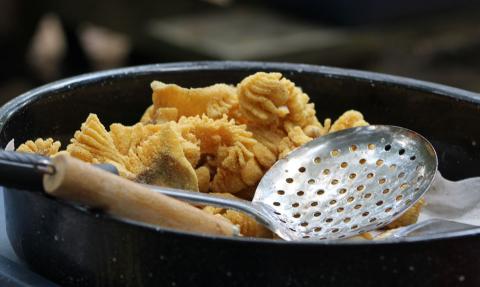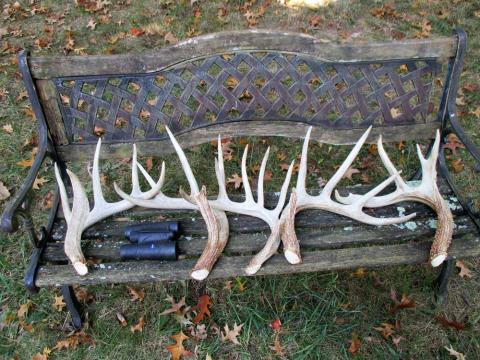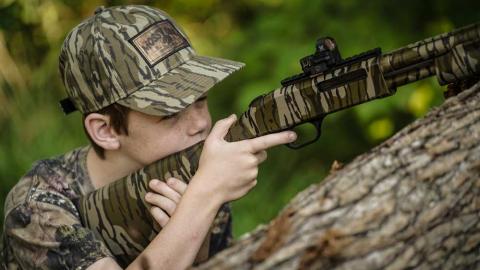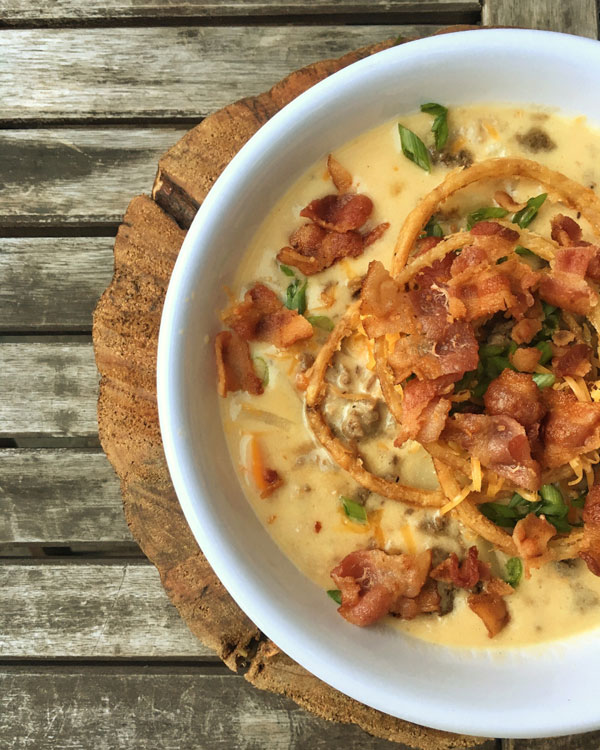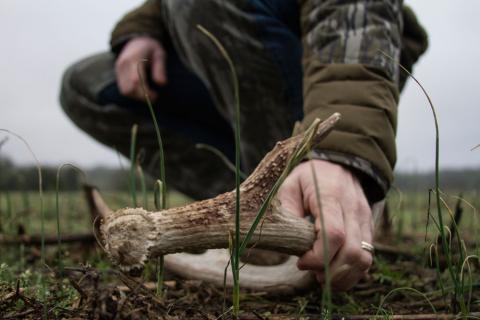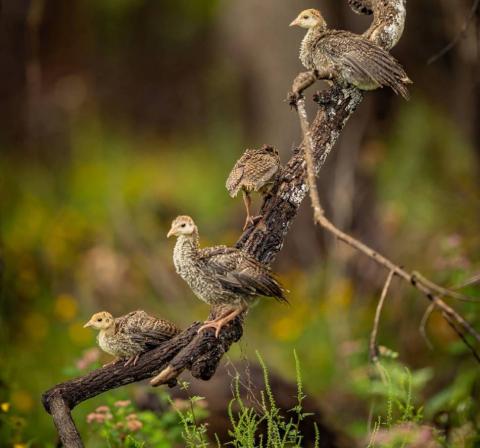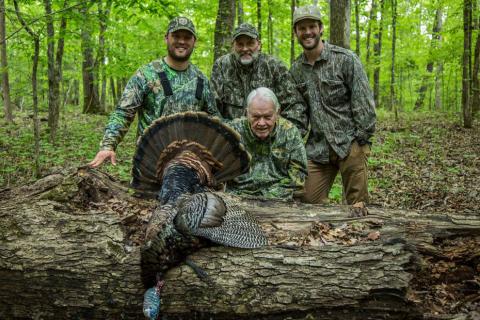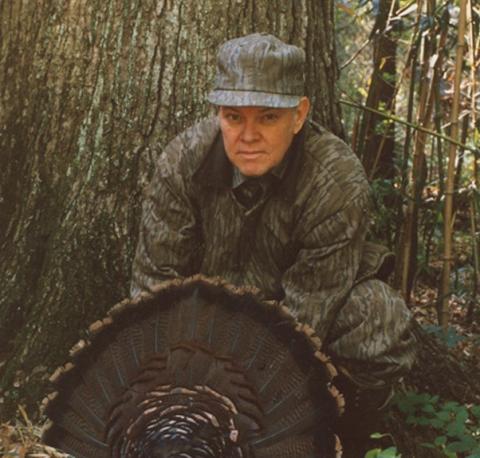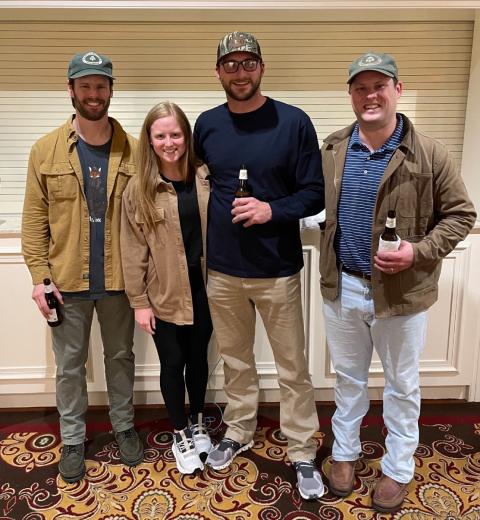Jason Patterson from Jackson, Tennessee, his wife Kim and their two sons Oakley and Devin are a family of GameKeepers. They're all involved in the outdoors, their family, hunting and fishing, as well as working with conservation organizations and representing Mossy Oak wherever they go.
“I've been involved with the Mossy Oak Pro Staff for many years,” Jason Patterson said. “I was Mossy Oak’s Waterfowl ProStaff Manager for the Mississippi Flyway. But when the opportunity to be the Manager of the Mid-South GameKeepers ProStaff came along, I jumped at the opportunity. My family was and is really involved in all types of hunting and fishing.”
Get Ready for Deer Season
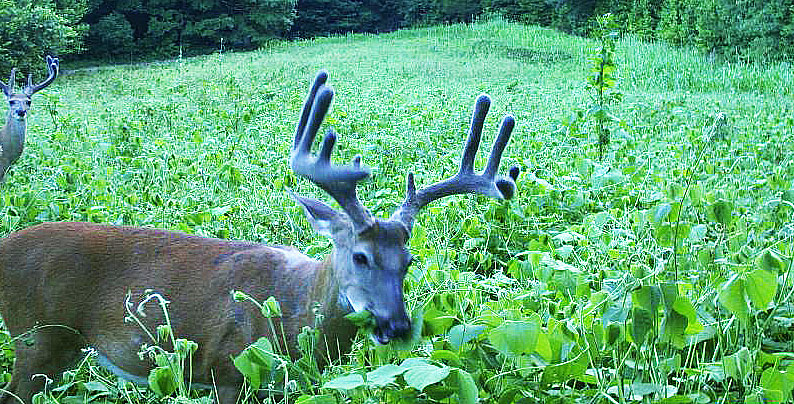
To get ready for deer season, we put out BioRocks in the early summer. Over every mineral rock, we put out trail cameras to census our deer herd, and to try and locate the bucks on the property we hunt as they’re growing their antlers. We try to put one BioRock Rock out per 50 acres in high deer-traffic areas. We have a few Mossy Oak BioLogic Non-Typical Clover plots that we've planted. We’ll be mowing our clover this summer and using herbicides to kill the weeds in the clover. We've learned that by managing these clover plots, our plots generally can last four or five years without having to be replanted.
The other plots we plant are fall plots. We divide out plots into two sections. One we plant and maintain in Non-Typical Clover, and in the other plot, we plant one of the BioLogic Fall Blends. The clover gives us a year-round food source, and the fall crop gives us a fall and winter crop to increase the amount of nutrition that the deer have in the fall and winter. We also be put up our tree stands in July. Then when we plant our fall crops, we try to stay away from the area until hunting season.
We finish Tennessee turkey season in mid-May, then we begin preparing the land for deer and waterfowl. Our GameKeepers program is a year-round operation, because we also guide and help other conservation organizations that are putting on hunts and having programs for new hunters, youngsters and disabled hunters. In-between all of our gamekeeping responsibilities, we also go fishing.
In June, we begin preparing the soil for our fall plantings. We usually plant our fall crops beside our clover patches in August. We like to plant Mossy Oak BioLogic Full Draw. For our early bow season, we also plant BioLogic Green Patch Plus.
We have a 50-acre swamp on our property that’s a deer sanctuary. It’s hard to get to, and it’s pretty much off limits for deer hunting. We totally stay out of that swamp. Around the swamp are mature pines, and we plant our green fields on the edges of the mature pines. The bigger bucks usually hold closer to the swamp, and the does generally hold closer to our food plots. One of the big advantages we have is the swamp offers about the only sanctuary for older-age-class bucks in our region.
We have about 300 acres of leased land that we hunt. We only harvest about eight deer a year off this property, and the majority of deer we harvest are does. Eight of us hunt the 300 acres, and we all have the same management philosophy. We take a couple of nice bucks each year off the lease, and the smaller bucks are usually taken by children or wives of the lease holders.
Since the State of Tennessee changed from a three-buck-per-season-per-person limit to two bucks per season per person, we’ve seen more bucks moving into the older-age classes. One of the neighbors on one side of our property has a clear-cut there. On the other end of our land, that neighbor has started managing his property and putting in food plots. The biggest buck we've taken on our property scored 156, and we took a nice buck last year that was about 140. The good news about the land I hunt is since all the people on our lease have the same management goals, we don’t need to have a lot of rules.
GameKeeping is a Family Affair
 One of the interesting developments in GameKeepers is that we’re seeing more women and children taking part in GameKeepers. My wife Kim is also on the Mossy Oak GameKeepers ProStaff.
One of the interesting developments in GameKeepers is that we’re seeing more women and children taking part in GameKeepers. My wife Kim is also on the Mossy Oak GameKeepers ProStaff.
“I wanted to learn more about the animals we’re hunting, and how to prepare the land before hunting season as well as after hunting season to provide more food for more wildlife,” Kim Patterson explains. “I'm still learning, as I think many of us are. I believe most women who become a part of GameKeepers are like me. They not only want to learn how to manage the land and the game, but also why certain techniques of land management and specific types of plantings at certain times of the year can increase the size and number of animals on the property we hunt.
“In the past, my main focus had been on fishing and duck hunting, but I took my first deer last season. Now I want to learn all I can about deer hunting, turkey hunting and working on the land to increase the numbers and sizes of deer and turkeys, as well as ducks that we have on the land we hunt. I also enjoy working with the people on the Mossy Oak ProStaff as well as the Mossy Oak people in West Point, Mississippi. I really enjoy learning, and that’s where I'm at with the GameKeepers program. I'm trying to learn all I can about how to produce more wildlife and why certain management techniques work better than little or no management does.
“I have two boys. Oakley is 18 and Devin is 25. Oakley and Devin have hunted and fished with Jason and me all their lives. We’ve raised them in the outdoors, and I've found that some of the best quality time that a family can have is being in and working in the outdoors. Oakley is headed to college at the University of Tennessee’s Martin branch, and his goal is to work for the Tennessee Wildlife Resource Agency. Devin graduated from The Art Institute of Tennessee in Nashville, and he loves to draw and paint wildlife. He actually placed in the Tennessee duck stamp competition.
“Wildlife has been an integral part of our family as far back as most of us can remember. We eat what we harvest. Wildlife saves on our grocery bill, and it’s delicious and nutritious. Wild game and fish are as organically pure as any meat available. We also process our own game. I guess my favorite deer recipe starts with tenderloin. We usually wrap it in bacon and grill it. Of course, we make poppers out of turkey breasts and duck breasts, too. We also cook our fish on the grill. Oftentimes, I think women are more health conscious than men. If you look at the nutritional value of wild meat compared to domestic livestock, you'll see that it’s a leaner meat and more heart healthy, and it’s free from steroids and antibiotics.
“As I mentioned earlier, I took my first buck this season. Jason helped me field dress, skin and process the meat, because I never had done that before. I'm not sure that I could process a deer by myself yet, because a deer is pretty heavy, but I enjoyed doing it.”
Growing as a GameKeeper

Although we wear several different patterns, Bottomland is still our family’s favorite. We live in a very wooded area, so Bottomland tends to blend with everything around us. When we’re duck hunting, we do a little bit of flooded-timber hunting. Of course, the Bottomland pattern blends in with tree trunks. We make our own blinds, and we brush them in with oak, since our area doesn’t have a lot of water grass like Louisiana and other parts of the country may have. When I had a turkey hunt for my Mossy Oak GameKeepers ProStaff, we hunted in Mississippi, and we didn’t use blinds. We just set up on trees wider than our shoulders, and that Bottomland pattern blended right in with the trees we were leaning up against.
I duck hunt with GameKeepers Bob and Suzie Smith of Lexington, Tennessee. Bob and I work together. They plant corn, millet and BioLogic Guide’s Choice that has a lot of grain in it that ducks really love.
When I first got involved in the Mossy Oak ProStaff 11 years ago, I mainly managed the Pro Staff on the Mississippi Flyway for ducks. But once the position came open to manage the GameKeepers ProStaff in the South-Central Region, I jumped at the opportunity, because it’s allowed me to learn so much more not only about waterfowl but also deer, turkey, small game and other big game. Now I'm not only working with waterfowlers, I'm dealing with people who are more concerned about a wide variety of game - how to better manage and increase game numbers on the properties they hunt. I've learned that just about every one of my prostaffers has a different approach as to how he manages the land he hunts - based on terrain, the amount of game they have to hunt, the soil quality, soil conditions and the management objectives that they’ve set up.
Another thing I like about GameKeepers is that the organization isn’t just about managing the land and wildlife on the land you hunt. GameKeepers is about giving back to the conservation movement as a whole. We volunteer often for the Tennessee Wildlife Federation. When they host hunts for children, we act as guides. We work with landowners, and we work with other conservation organizations to help them.
Before I started managing GameKeepers South-Central Region, I had a fairly good working knowledge of how to plant and mange land for wildlife. But since I've become the regional manager, I've also learned how to farm for wildlife, and how to improve property - even if you don’t have much land. I've learned so much about agriculture and land management that I hadn’t known until I became a part of GameKeepers. I've also learned that different management practices work or don’t work, depending on predators in an area, the terrain and the soil types. So, where I was primarily focused before on how to improve habitat for wildlife in my region, I've also learned some new techniques that people in other sections of the South can use to deal with situations that I've never experienced.
A GameKeeper’s Vision
The GameKeepers TV show has helped a lot to get the word out. I hope that one day we have pamphlets and booklets that we can give to landowners with step-by-step instructions on what they can do, and show them how some management can increase wildlife on their properties. We also could give some of this information to different organizations that we work with, like Wounded Warriors, Hope Outdoors and people with disabilities. These booklets and pamphlets could show what each one of us individually can do to increase the amount of wildlife and the number of hunters, fishermen and participants in all of our outdoors pursuit.
I hope that GameKeepers will work toward having more educational tools that we can give out to landowners, hunting clubs, fishing clubs and other organizations that relate to the outdoors and the wildlife on the land. I’d also like to see GameKeepers develop more educational and resource materials for youngsters to learn about the outdoors and how they can help to improve habitat and grow more and bigger critters.
GameKeepers is More than Land and Wildlife Management
 I believe one of our responsibilities as GameKeepers is not only to help improve the land we hunt for wildlife, but also to help inspire young people who are the next generation of outdoors men and women. Our son Oakley won a scholarship from the West Tennessee National Wild Turkey Federation (NWTF) chapter. This scholarship will help us pay for college when he starts in the fall. Not only have our sons Oakley and Devin been involved in hunting and fishing all their lives, they also help Kim and me when we present programs for conservation organizations, when we talk to young people about gamekeeping, and when we guide young hunters for other conservation organizations.
I believe one of our responsibilities as GameKeepers is not only to help improve the land we hunt for wildlife, but also to help inspire young people who are the next generation of outdoors men and women. Our son Oakley won a scholarship from the West Tennessee National Wild Turkey Federation (NWTF) chapter. This scholarship will help us pay for college when he starts in the fall. Not only have our sons Oakley and Devin been involved in hunting and fishing all their lives, they also help Kim and me when we present programs for conservation organizations, when we talk to young people about gamekeeping, and when we guide young hunters for other conservation organizations.
I’d like to see us do more for other organizations that have the same goals and purposes that GameKeepers does. One of the things that many people don’t know about GameKeepers and the GameKeepers program is how we help other conservation organizations with their programs, and how we do in-store promotions at sporting-goods stores to promote gamekeeping. GameKeepers are not only individuals who are trying to improve their own land for wildlife. GameKeepers is also a support organization that encourages land management, conservation organizations and the entire outdoors community.
GameKeepers is not only an educational arm of Mossy Oak and BioLogic. We’re also a service organization devoted to helping and assisting other groups and other organizations with their outdoors programs and educating newcomers to the outdoors. I’ve seen the positive effect that being in the outdoors has had on my boys and on our entire family, like many others in the GameKeepers program.
I've learned that once an individual becomes involved with the Mossy Oak GameKeepers Program that more than likely his or her entire family will get involved. So, we want to help build and grow the outdoors community and the numbers of hunters, fishermen and outdoors enthusiasts who will help all the sports in the outdoors stay strong and grow, as well as continuing to disseminate information on land management and improving habitat for wildlife.
For more information about GameKeepers and their practices, go to http://www.gamekeepersclub.com.
















